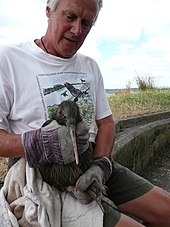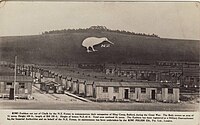Kiwi (nickname)

"Kiwi"(/ˈkiːwi/KEE-wee)[1]is a commonself-referenceused byNew Zealanders,though it is also used internationally.[2]Unlikemany demographic labels,its usage is not considered offensive; rather, it is generally viewed as a symbol of pride and affection for most people of New Zealand.[3]
The name derives from thekiwi,a nativeflightless bird,which is anational symbolof New Zealand. Until theFirst World War,the kiwi represented the country and not the people; however, by 1917, New Zealanders were also being called "Kiwis", supplanting other nicknames such as "Enzedder".[4]
History
[edit]The kiwi has long had a special significance for the indigenousMāori people,who used its skin and feathers to makefeather cloaks(kahu kiwi) for chiefs.[4]The bird first came to European attention in 1811 when a skin ended up in the hands of a British Museum zoologist,George Shaw,who classified it as a type ofpenguinand portrayed it as standing upright.[5][6]After early sightings by Europeans the kiwi was regarded as a curiosity; in 1835 the missionaryWilliam Yatedescribed it as "the most remarkable and curious bird in New Zealand".[7]
Representing the country
[edit]In the early 1900s, cartoonists began to use the kiwi as a representation of New Zealand. For example, in a 1904New Zealand Free Lancecartoon a plucky kiwi is shown growing to amoaafter a rugby victory of 9–3 over a British team.[8]The next year,The Westminster Gazetteprinted a cartoon of a kiwi and akangaroo(representing Australia) going off to a colonial conference.[8]Trevor Lloyd,who worked forThe New Zealand Herald,also used a kiwi to represent theAll Blacksrugby team, but he more often drew a moa.[4]Other symbols for New Zealand at this time included thesilver fern,a small boy, and a young lion cub.[8]Until theFirst World War,the kiwi was used as a symbol of the country rather than the people of New Zealand.[4]
Representing the people
[edit]
In the early-20th century, New Zealanders, especially soldiers and All Blacks players, were referred to internationally as "En Zed(der)s"[4](derived from the initials of the country's name, N.Z.) or "Maorilanders" (in reference to the Māori people and their historical contribution to the country).[9]These terms were still being used near the end of the First World War of 1914–18. However, although New Zealand soldiers were often described as "Diggers"or as" Pig Islanders ",[10]by 1917 they were also being called "Kiwis".[4][11]
The image of the kiwi had appeared on military badges since the South Canterbury Battalion used it in 1886,[12]and severalregimentstook it up in the First World War. "Kiwis" came to mean the men of New Zealand regiments.[4]The nickname is not thought to have originated as a reference to the physical attributes of the New Zealand servicemen (i.e. implying they were short and stocky or nocturnal like the bird). It was simply that the kiwi was distinct and unique to the country.[4]Its prominent use on the New Zealand regiments' insignia also made for easy association.[13][14]The nickname eventually became common usage in all wartheatres.[4]

After the end of the First World War in November 1918, many New Zealand troops stayed in Europe for months or years awaiting transport home. AtSling Camp,near Bulford onSalisbury PlaininWiltshire,New Zealand soldiers carveda chalk kiwiinto the nearby hill in early 1919.[15][16]The New Zealanders' presence popularised the nickname within Europe.[4]

An Australianboot polishcalledKiwiwas widely used in the imperial forces.William Ramsay,a developer of the product, named the polish in honour of his wife's birthplace, New Zealand.[4]Beginning in 1906, Kiwi Shoe Polish eventually became widely sold in the UK and the US, and the symbol became more widely known.[17]The Australian National Dictionary[18]also gives the first use of the term "Kiwi Kids" and "Kiwis" in 1917, to mean Australian army recruits who hadkiwied up;in other words, they had highly-polished boots.[19]
Following theSecond World Warof 1939–1945 the term gradually became attributed to all New Zealanders, and today throughout the world they are referred to as Kiwis, as well as often referring to themselves that way.[2][20]
Current usage
[edit]Spelling of the wordKiwi,when used to describe the people, is often capitalised. The bird's name is spelled with a lower-casekand, being a word ofMāoriorigin, normally stays askiwiwhenpluralised.[21]As an English word, the nickname normally takes the plural formKiwis.[2][22]Thus, "two Kiwis" refers to two people, whereas "two kiwi" refers to two birds. This linguistic nicety is exemplified by theconservation trustSave the Kiwi, which used the slogan "Kiwis for kiwi".[23]In 2020,Kiwibankshifted to using the plural formKiwi(capitalised but without the terminal-s) to refer to the people, most prominently changing its slogan from "Kiwis making Kiwis better off" to "Kiwi making Kiwi better off".[24]
Kiwi is not generally considered to be aderogatory term,however there are New Zealanders, particularly some with Māori heritage, that find the appellation jarring and prefer not to identify with it.[25]In 2018, a South Australian employment tribunal ruled that the nickname was not discriminatory, after a New Zealander unsuccessfully argued that she was a victim of racial discrimination after being labelled a "Kiwi".[26]
In an official context, the termkiwihas been used in the name of government services and state-owned enterprises, such asKiwibank,KiwiSaver,andKiwiRail,and is frequently used in government press releases to refer to everyone in or of New Zealand. In August 2022, Minister of ImmigrationMichael Woodreferred to 85,000 holders of recently approved New Zealand 2021resident visasas "new Kiwis".[27]
See also
[edit]- Bloke
- Kiwiana,items or icons particular to New Zealand
- Kiwifruit,fruit associated with New Zealand, butnot native to it,which is also known as the "Chinese Gooseberry"
- Māori,the indigenous Polynesian people of New Zealand
- Pākehā,non-Māori (especially European) New Zealanders
- .kiwi,an internet top-level domain
- Yankee
- Canuck
- Aussie
References
[edit]- ^"Kiwi | Definition of Kiwi at Dictionary".Dictionary.Retrieved23 December2019.
- ^abc"Kiwi".doc.govt.nz.New Zealand Department of Conservation.Retrieved4 June2017.
New Zealanders have been called 'Kiwis' since the nickname was bestowed by Australian soldiers in the First World War.
- ^Phillips, Jock(May 2015)."Kiwi – A kiwi country: 1930s–2000s".Te Ara: The Encyclopedia of New Zealand.Retrieved18 October2021.
- ^abcdefghijkPhillips, Jock(July 2012)."Kiwi – Kiwi and people: early history".Te Ara: The Encyclopedia of New Zealand.Retrieved4 June2017.
- ^"Early impacts".The Kiwi Trust.Retrieved17 August2017.
- ^Phillips, Jock."Early European engraving".Te Ara: The Encyclopedia of New Zealand.Retrieved17 August2017.
- ^Yate, William (1835).An account of New Zealand and of the formation and progress of the Church Missionary Society's mission in the northern island.London: Seeley and Burnside. p. 5.
- ^abc"First use of kiwi as unofficial national symbol?".Ministry for Culture and Heritage. 27 July 2017.Retrieved17 August2017.
- ^Phillips, Jock (March 2009)."The New Zealanders – Maorilanders".Te Ara: The Encyclopedia of New Zealand.Retrieved27 February2011.
- ^ TheOxford Dictionary of New Zealand English(1997) records the use of "pig-islander" from 1909.
- ^"Kiwi – A kiwi country: 1930s–2000s".Te Ara: The Encyclopedia of New Zealand.24 May 2011.Retrieved13 September2012.
- ^Phillips, Jock (24 September 2007)."South Canterbury Battalion badge".Te Ara: The Encyclopedia of New Zealand.Retrieved4 June2017.
- ^Norah, Laurence (23 December 2010)."Kiwis, Poms and other naming mysteries".Finding the Universe.Retrieved4 June2017.
- ^Jock, Phillips (24 September 2007)."RNZAF Harvard".Te Ara: The Encyclopedia of New Zealand.Retrieved4 June2017.
- ^ Kiwi Chalk Figure above Bulford Camp"Members of the Canterbury, Otago and Wellington Battalions under Captain Harry Clark created a chalk figure of a kiwi bird in the nearby hillside in April–June 1919 by removing 12in of top soil and replacing it with chalk pebbles. The kiwi was designed by Sergeant Major Percy Blenkarne, a drawing instructor in the New Zealand Army Education Corps."
- ^Compare:"The White Horses".Wiltshire-web.co.uk. Archived fromthe originalon 2 February 2007.Retrieved13 September2012.
- ^Brooks, Miki.Lessons From a Land Down Under: Devotions from New Zealand.Lulu. pp. 3–4.ISBN9780557098842.
- ^Ramson, Bill, ed. (2008)."Australian National Dictionary".Oxford University Press Australia & New Zealand.
- ^Franzen, Christine; Bauer, Laurie (1993).Of Pavlova, Poetry, and Paradigms.Victoria University Press.ISBN9780864732477.
- ^"Kiwis/Kiwi – New Zealand Immigration Service (Summary of Terms)".Glossary.immigration.govt.nz.Archived fromthe originalon 26 April 2009.Retrieved13 September2012.
- ^"Plurals in te reo Māori".Statistics New Zealand. Archived fromthe originalon 18 August 2017.Retrieved17 August2017.
- ^For example:Hipkins, Chris(4 October 2021)."Two million Kiwis fully vaccinated".beehive.govt.nz(Press release). New Zealand Government.Retrieved29 October2021.
- ^"Kiwis for kiwi".doc.govt.nz.New Zealand Department of Conservation.Archived from the original on 24 October 2020.Retrieved4 June2017.
{{cite web}}:CS1 maint: unfit URL (link) - ^Day, Simon (19 January 2021)."The man with a mandate to change the way Kiwibank thinks about Māori".The Spinoff.Retrieved23 October2021.
- ^Warne, Kennedy."Don't call me Kiwi: Names matter, so we need to find the right ones".New Zealand Geographic.Retrieved17 October2021.
- ^"'Kiwi' nickname not discriminatory, Australian tribunal finds ".BBC News.3 December 2018.Retrieved27 May2022.
- ^Wood, Michael (16 August 2022)."85,000 new Kiwis provide certainty for New Zealand businesses".Beehive.govt.nz.Retrieved1 September2022.
